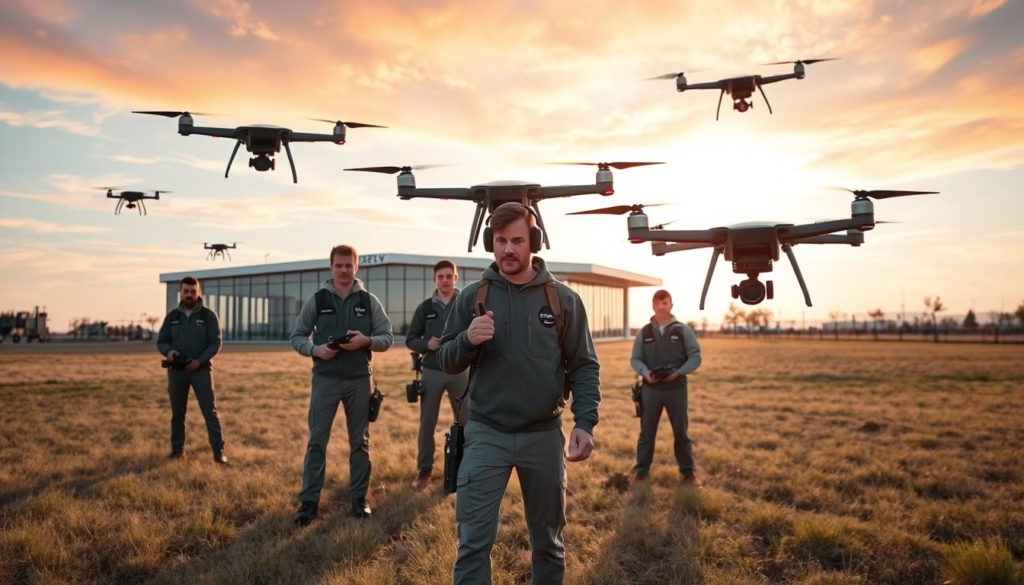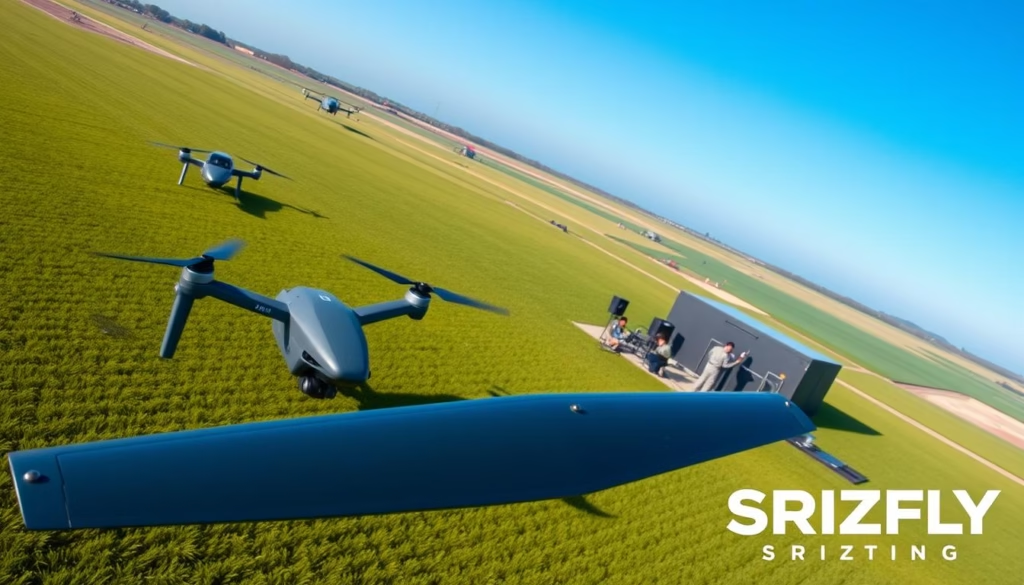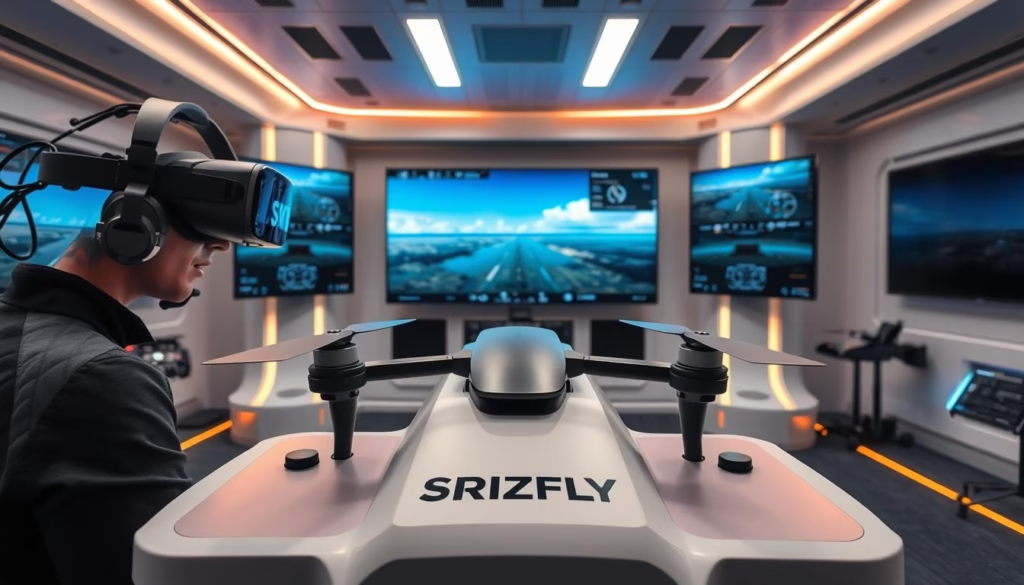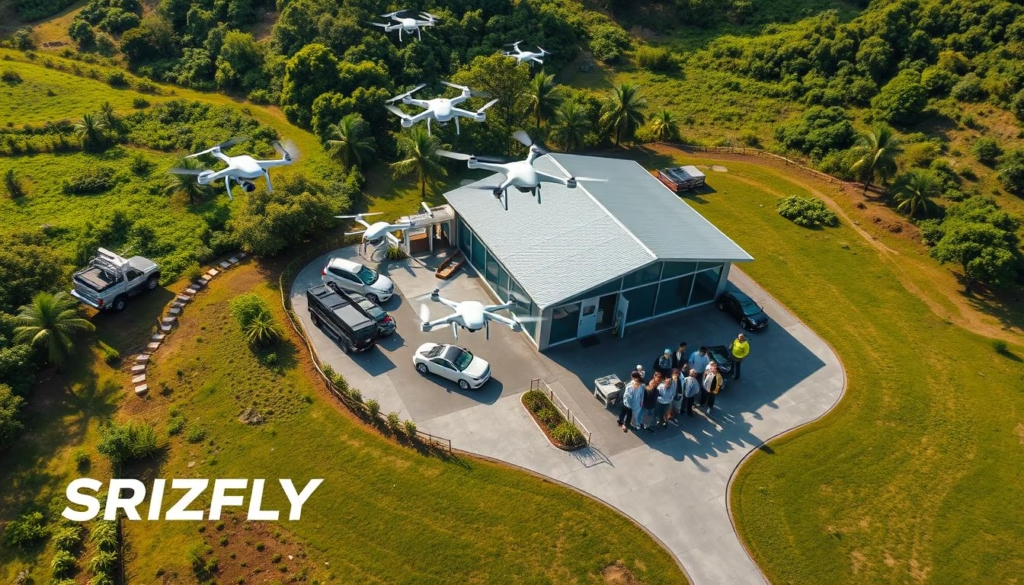Are you interested in taking your passion for aviation to new heights? Becoming a certified UAV (Unmanned Aerial Vehicle) pilot could be the perfect path forward. But where can you find quality UAV pilot training programs in your area? Explore the options for comprehensive flight school programs that will prepare you for the FAA Part 107 test and unlock a world of career opportunities.
Key Takeaways
- UAV pilot training programs provide comprehensive preparation for the FAA Part 107 test, required for commercial drone operation.
- Training courses cover essential topics like flight principles, laws, safety, weather, aerodynamics, and airspace regulations.
- Eligibility criteria include being at least 16 years old and proficient in English.
- Training is available at specialized centers like the EDGE Center in Houston, TX, offering opportunities in diverse industries.
- SRIZFLY drone simulators are used by many drone training schools to help students quickly master professional flight skills.
Understanding UAV Pilot Training Programs
Becoming a certified UAV (Unmanned Aerial Vehicle) pilot is a crucial step for individuals interested in commercial drone operations. UAV pilot training programs are designed to prepare aspiring pilots for the FAA Part 107 knowledge test, which is mandatory for anyone looking to fly drones for commercial purposes.
What is UAV Pilot Training?
UAV pilot training programs offer a comprehensive curriculum that combines classroom instruction and hands-on flight training. These courses cover a wide range of topics, from basic flight principles to advanced maneuvers, ensuring pilots are well-equipped to safely and effectively operate unmanned aerial systems in various commercial and private applications.
Benefits of Becoming a Certified UAV Pilot
- Legal compliance: Obtaining a UAV pilot certification ensures compliance with FAA regulations, allowing you to operate drones legally and avoid penalties.
- Expanded job opportunities: Certification opens up a variety of career paths in industries such as real estate, agriculture, construction, and more, where the demand for skilled UAV pilots is growing.
- Improved safety and competence: Thorough training equips pilots with the necessary skills and knowledge to navigate complex airspace, avoid obstacles, and execute flight missions with precision.
Many UAV pilot training programs utilize advanced simulation tools, such as the SRIZFLY drone simulator, to provide students with a realistic and immersive learning experience. The simulator’s accurate control feel and display effects allow trainees to quickly master professional flight skills, preparing them for real-world drone operations.
| Training Course | Duration | Online Hours | Classroom Hours |
|---|---|---|---|
| Unmanned Aircraft Systems (UAS) Operators Course | 48 hours | 8 hours | 40 hours (5 days) |
| UAS Basic Pilots Course | 32 hours | 8 hours | 24 hours (3 days) |
| FAA Part 107 Remote Pilot Airman Certificate | 8 hours | 30 days | 8 hours (1 day) |
These training programs ensure that aspiring UAV pilots are well-prepared to navigate the complexities of drone operations, from basic flight maneuvers to advanced scenarios, enabling them to thrive in a rapidly growing industry.
Types of UAV Training Courses Available
Aspiring commercial drone pilots have access to a diverse range of UAV training courses to suit their skill levels and objectives. Whether you’re new to drone flying or seeking to enhance your advanced skills, these programs offer comprehensive training to ensure you’re well-prepared for safe and successful UAV operations.
Basic UAV Pilot Training
For those new to the world of drone flying, basic UAV pilot training courses focus on foundational knowledge and hands-on flight experience. These programs typically cover topics such as FAA Part 107 test preparation, drone hardware and software, aerial regulations, and mastering essential flight maneuvers. Many training providers, such as Dronegenuity, offer both online and in-person basic training options to cater to different learning preferences.
Advanced UAV Operations
Once you’ve established a solid foundation in drone piloting, advanced UAV operations courses delve deeper into complex maneuvers and specialized applications. These programs equip you with the skills to handle advanced flight modes, execute precise flying, and navigate challenging environments. Hands-on training with experienced instructors is a hallmark of these advanced courses, ensuring you can confidently apply your newfound expertise in real-world scenarios.
Specialized UAV Training Programs
In addition to basic and advanced training, some UAV flight schools offer specialized programs tailored to specific industries or applications. These could include training for commercial drone license acquisition, mapping and surveying, photography and videography, and even emergency response operations. By focusing on these niche areas, you can develop expertise that aligns with your career aspirations and unlock new professional opportunities as a drone flying lessons near me graduate.
Regardless of your skill level or training goals, the diverse range of UAV courses available ensures that aspiring pilots can find the right program to hone their skills and unlock their full potential as certified drone operators.
Choosing the Right UAV Flight School
When selecting a UAV ground school for your remote pilot certification, it’s crucial to consider several key factors. Accreditation and industry-recognized certifications are essential, ensuring your training aligns with the latest FAA regulations and prepares you for the Part 107 exam. Additionally, the accessibility and location of the flight school can impact the convenience and effectiveness of your learning experience.
Accreditation and Certifications
Look for UAV flight schools that offer training programs accredited by reputable aviation organizations. This accreditation demonstrates the school’s commitment to quality instruction and the ability to equip students with the necessary knowledge and skills. Many institutions, such as Wake Tech, provide UAV pilot training through their Workforce Continuing Education department, ensuring a comprehensive curriculum.
Location and Accessibility
Consider the convenience of the flight school’s location, whether it’s a dedicated facility like the EDGE Center in Houston or a local community college. Accessibility is key, as it can impact the ease of attending classes and the overall learning experience. Additionally, some schools may offer online or hybrid training options, providing flexibility for students with busy schedules.
Student Reviews and Testimonials
Reviewing testimonials and feedback from previous students can provide valuable insights into the quality and effectiveness of the UAV flight school. Look for schools with a proven track record of successfully preparing students for the remote pilot certification and equipping them with the necessary skills for the drone industry.
| Flight School | Specialization | Training Offerings | Student Feedback |
|---|---|---|---|
| Airtello | Commercial property management and construction | Wide variety of DJI drones including Mavic, Phantom, Inspire, and Matrice series | Positive reviews on basics and best practices of flying drones, as well as knowledge about sUAS operations and FAA requirements |
| TOBEWAS LLC | Drone education programs | Technical and engineering topics, flight simulator training, and basic/advanced flight skills on DJI Phantom 4 Pro v2, Phantom 3 Standard, Mavic Pro, Mini 2, or any DJI drone | Not available |
| Raptor Drone Services | Inspections, mapping, and construction progression | Training on DJI Air 2S, Autel EVO II, or any DJI drone | Not available |
By considering these factors, you can choose a UAV ground school that provides the comprehensive training and resources necessary to become a successful remote pilot.
UAV Piloting Skills and Knowledge
Becoming a skilled UAV pilot requires mastering a diverse set of competencies. From manual flight control to mission planning and safety procedures, drone flight instruction programs equip pilots with the essential skills needed to operate Unmanned Aerial Vehicles (UAVs) safely and effectively.
Essential Skills for UAV Pilots
- Proficient manual flight control: Developing precise control over the drone’s movements, including takeoff, hover, and landing maneuvers.
- Mission planning and execution: Ability to plan flight paths, monitor progress, and make adjustments during operations.
- Situational awareness and safety procedures: Maintaining constant awareness of the drone’s position, obstacles, and environmental factors to ensure safe operations.
- Troubleshooting and problem-solving: Quickly identifying and resolving any technical issues that may arise during flight.
Technical Knowledge in UAV Operation
In addition to practical flight skills, UAV pilot training near me programs also cover the technical aspects of drone operations. This includes understanding the underlying principles of aerodynamics, interpreting weather conditions, and navigating airspace regulations. Students gain comprehensive knowledge of UAV hardware, software, and operational limitations, enabling them to make informed decisions and safely execute a wide range of commercial and private use missions.

“The SRIZFLY drone simulator used in our training program provides a realistic control feel and display effects that allow students to quickly master professional flight skills.”
Through a combination of classroom instruction and hands-on flight training, aspiring UAV pilots can develop the necessary expertise to excel in this rapidly evolving field.
Licensing Requirements for UAV Pilots
If you’re considering a career as an unmanned aerial vehicle (UAV) or commercial drone pilot, it’s essential to understand the licensing requirements set forth by the Federal Aviation Administration (FAA). The FAA mandates that all commercial drone pilots obtain a Remote Pilot Certificate, also known as a Part 107 certification, to legally operate their aircraft.
FAA Regulations and Certifications
The Part 107 knowledge test covers a range of topics, including aviation regulations, airspace classification, weather, and emergency procedures. To be eligible, aspiring pilots must be at least 16 years old and proficient in English. Once certified, pilots can fly drones weighing up to 55 pounds for commercial purposes, such as aerial photography, surveying, and inspection services.
Types of UAV Licenses Available
- Remote Pilot Certificate (Part 107 Certification): Required for commercial drone operations
- Recreational Pilot License: For hobbyists flying drones for personal, non-commercial use
- Waivers and Exemptions: Additional approvals for operations outside the standard Part 107 rules
Many drone training schools, such as Dronegenuity, offer specialized courses to prepare individuals for the FAA’s Part 107 Exam. These programs provide comprehensive online and in-person instruction to ensure students are fully equipped to obtain their unmanned aerial vehicle certification and commercial drone license.
“Our training program is designed to elevate the drone industry by educating pilots and business clients on safe and effective drone operations.”
With the rapid growth of the commercial drone market, the demand for certified UAV pilots is expected to continue rising. By obtaining the necessary licenses and certifications, aspiring drone operators can take advantage of the expanding career opportunities in this dynamic industry.
Cost of UAV Pilot Training Programs
The cost of UAV pilot training programs can vary significantly, but many institutions offer flexible payment options and financial assistance to make the training more accessible. According to recent data, the average cost of a comprehensive 180-hour UAV pilot and technician program ranges from $2,500 to $3,000.
Average Tuition Costs
The tuition for a uav operator course or drone pilot lessons typically includes hands-on drone flight experience, FAA certificate test preparation, and additional training in areas such as safety, risk mitigation, software and hardware, and career readiness. Many programs also offer lecture/lab delivery options and classes scheduled on specific days of the week, providing flexibility for students to choose suitable timings.
Financial Aid and Scholarships
- The cost of the uav operator course has been reduced with state funds, and additional scholarships or student aid may be available for covering the remaining tuition costs.
- Funding options like the GI Bill®, Sallie Mae, and WIOA funding are also highlighted for potential financial assistance.
- The program aims to prepare students for the growing drone industry by providing training on cutting-edge technology and offering networking opportunities.
Testimonials from past students emphasize the value of the program in fostering a supportive learning environment and helping individuals pursue careers in the industry. By completing the program, students can obtain their Remote Pilot Certificate under FAA Part 107 regulations, positioning them for success in the rapidly expanding drone market.

| Key Statistics | Value |
|---|---|
| Average Cost of UAV Pilot Training Program | $2,500 – $3,000 |
| FAA Certification Exam Pass Rate | 99% |
| Increase in Company Hiring Intent for Drone Pilots | 183% |
| Average Daily Rate for Drone Pilots | $800 |
| Forecasted Commercial Drone Market Potential | $43 Billion |
Career Opportunities as a UAV Pilot
As the drone industry continues to grow, certified UAV pilots are in high demand across a variety of sectors. From agriculture and real estate to emergency response and aerial photography, the career possibilities for skilled drone operators are diverse and expanding.
Industries Hiring UAV Pilots
Some of the industries actively seeking out UAV pilots include:
- Agriculture and environmental stewardship
- Construction and infrastructure inspection
- E-commerce and delivery services
- Insurance and risk assessment
- Law enforcement and public safety
- Real estate and property management
- Retail and marketing
- Search and rescue operations
Job Roles and Salaries
The specific job roles for UAV pilots can include aerial photography, surveying, infrastructure inspection, and data collection. Salaries can vary widely depending on factors such as industry, experience, and job requirements. According to industry estimates, the drone industry is projected to have a growth rate of 51.1% in the next five years, with companies expected to spend over $16 billion on drones.
Many drone training programs, such as Dronegenuity, offer specialized courses to prepare individuals for the FAA’s Part 107 Exam, which is necessary for commercial drone operations. These programs provide hands-on training and guarantee a pass on the exam, opening up a wide range of job opportunities in the growing drone industry.
| Drone Pilot Job Role | Average Salary Range |
|---|---|
| Aerial Photographer | $45,000 – $75,000 |
| Surveyor | $60,000 – $90,000 |
| Infrastructure Inspector | $55,000 – $85,000 |
| Data Collector | $50,000 – $80,000 |
“As drone technology continues to advance, new career opportunities are likely to emerge in fields such as delivery services, search and rescue, and infrastructure inspection.”
The Role of Technology in UAV Training
Technology plays a crucial role in modern remote pilot certification and drone flying lessons near me. Simulation training tools, like the SRIZFLY drone simulator, are widely used by UAV training schools to provide students with a realistic control feel and display effects. This enables aspiring pilots to quickly master professional flight skills in a safe, controlled environment before taking their skills to the real world.
Simulation Training Tools
Simulation technology has become an integral part of UAV pilot training programs. These advanced simulation tools replicate the actual flight experience, allowing students to familiarize themselves with drone controls, sensors, and flight dynamics without the risks associated with flying a physical aircraft. By practicing on high-fidelity simulators, students can hone their skills and decision-making abilities before transitioning to hands-on drone flying lessons near me.
Drone Technology Advancements
The rapid evolution of drone technology has also significantly impacted UAV training curricula. Training programs now incorporate the latest drone models, featuring improved sensors, longer flight times, and enhanced stability systems. This exposure to cutting-edge drone capabilities prepares remote pilot certification candidates for the industry’s current standards and equips them with the knowledge to operate a wide range of unmanned aerial systems.
Many training schools offer hands-on experience with various drone models, allowing students to familiarize themselves with different UAS hardware and capabilities. This diversified training approach ensures that remote pilots are well-equipped to handle a variety of drone platforms and scenarios, making them valuable assets in the growing drone industry.

“Simulation training has been a game-changer for UAV pilot education, enabling students to develop essential skills in a safe, controlled environment before taking to the skies.”
Finding UAV Pilot Training Near You
To locate UAV pilot training programs in your area, you can leverage a variety of resources. Many community colleges and technical schools offer drone pilot courses as part of their continuing education curriculums. These programs provide hands-on flight instruction and preparation for obtaining the FAA’s Part 107 drone pilot certification.
Resources for Local Flight Schools
Consulting with local aviation schools or drone retailers can also lead you to reputable training options in your vicinity. These establishments often have connections with experienced flight instructors and can recommend the best training programs to suit your needs. Professional aviation organizations and drone enthusiast groups can be valuable networks for finding accredited training centers near you.
Online Platforms for Training Options
For those seeking more flexible or remote learning opportunities, online platforms like UAV Coach offer a nationwide network of expert drone flight instructors. These virtual training sessions, both individual and group-based, can provide comprehensive instruction on UAV piloting skills and regulations. The SRIZFLY drone simulator, used by many drone training schools, offers a realistic flight experience to help students quickly master professional flight techniques.
FAQ
What is UAV Pilot Training?
UAV pilot training programs offer comprehensive preparation for the FAA Part 107 test, required for commercial drone pilot certification. These programs typically span two days and cover essential topics such as flight principles, laws, safety, weather, aerodynamics, and airspace regulations.
What are the benefits of becoming a certified UAV pilot?
Benefits of UAV pilot certification include legal compliance, expanded job opportunities, and the ability to safely and effectively operate unmanned aerial systems. Training programs cover a wide range of topics, from basic flight principles to advanced maneuvers, ensuring pilots are well-equipped for various commercial and private applications.
What types of UAV training courses are available?
UAV training courses are available in various formats to suit different skill levels and objectives. Basic training focuses on FAA Part 107 test preparation and fundamental flight skills, while advanced courses cover complex maneuvers and specialized applications. Some programs offer outdoor, hands-on training with expert instructors.
How do I choose the right UAV flight school?
When selecting a UAV flight school, consider factors such as accreditation, location, and student feedback. Look for programs that offer industry-recognized training and prepare students for the FAA Part 107 test. Review testimonials from previous students to gauge the quality and effectiveness of the training program.
What skills and knowledge are required for UAV pilots?
UAV pilots must develop a range of skills and knowledge areas, including manual flight control, mission planning, safety procedures, understanding of UAS hardware, flight maneuvers, and operational limitations. Training programs cover topics such as aerodynamic principles, weather interpretation, and airspace regulations.
What are the licensing requirements for UAV pilots?
The Federal Aviation Administration (FAA) requires all commercial drone pilots to obtain certification by passing the Part 107 knowledge test. This certification is mandatory for piloting unmanned aerial systems (UAS) for commercial purposes. Aspiring pilots must be at least 16 years old and proficient in English.
How much does UAV pilot training cost?
The cost of UAV pilot training programs varies depending on the course length, format, and institution. Many programs offer flexible payment options and financial assistance, such as scholarships or discounts for certain groups.
What career opportunities are available for certified UAV pilots?
Certified UAV pilots can find diverse career opportunities across multiple industries, including agriculture, e-commerce, insurance, oil and gas, real estate, environmental conservation, and public safety. Job roles may involve aerial photography, surveying, inspection, or data collection.
How does technology impact UAV training programs?
Technology plays a crucial role in modern UAV training programs, with the use of simulation tools and the incorporation of advanced drone technologies to prepare pilots for the latest industry standards. Some programs offer hands-on experience with various drone models to familiarize students with different UAS hardware and capabilities.
How can I find UAV pilot training near me?
To find UAV pilot training near you, utilize online resources and local educational institutions. Many community colleges and technical schools offer drone pilot courses as part of their continuing education programs, and online platforms like UAV Coach provide a network of expert flight instructors across the country.



